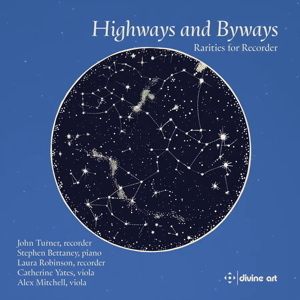
Highways and Byways: Rarities for Recorder
John Turner (recorder)
Stephen Bettaney (piano), Laura Robinson (recorder), Catherine Yates (viola), Alex Mitchell (viola)
rec. 2023, St. Elizabeth’s Church, Ashley, UK
Divine Art DDX21245 [2 CDs: 105]
John Turner, now in his early 80s, keeps recording rare and little-known works by rarely heard or little-known composers. His rate of learning is phenomenal, and his tone quality and virtuosity still shine through. He is a giant in the recorder world, as this twofer clearly demonstrates.
Some of the fourteen composers here can be strongly associated with John Turner, like David Ellis, John McCabe and Thomas Pitfield, who may have been or were his personal friends. Ellis worked for a while at the BBC. His Three Encores for solo recorder are challenging and exciting. The attractive Mount Street Blues, dedicated to his friend McCabe, refers to the street in Liverpool where McCabe spent his early youth.
Pitfield is represented by two miniatures. Dancery – a title borrowed from the renaissance composer Tielman Susato – is a set of tuneful dances. Pitfield’s ability to write an earworm shows too in A Little Caribbean, which spends much time in 7/8.
There are McCabe’s two brief pieces here, in an unusually sunny mood. He wrote Sam’s Tune for a Granada TV series in 1973. Domestic Life is an arrangement of ‘three tunes from an entertainment originally for voices in ensemble from 1969’.
The album kicks off with Lennox Berkeley’s three-movement Sonatina, a joyous performance of a joyous work. The longest work on the first disc David Butler’s Summer Triangle. Butler explains that these are Altair, Deneb and Vega, three stars in a constellation seen especially in the summer months. As he wandered Suffolk beaches, he was struck by the magic of the scene and by the rising moon, but this is not necessarily Romantic nature music. There is atmosphere and vitality, and some dissonance, all under the umbrella of arresting ideas and melodies. That is quite a highlight. The box cover shows the night sky which inspired the work.
John Turner himself is no mean composer, with many choral works in his catalogue, for instance. He wrote The Sad Pavane in 2022 for a video made in support of the Ukrainian people. There follows the brief and jazzy Hopscotch from 2012. In a way, this sums up the album: beautifully crafted, idiomatically conceived music, largely undemanding and tuneful. Needless to say, it is played immaculately and expressively, accompanied by the supportive and sensitive stalwart Stephen Bettaney.
It may be difficult to find originality in some of the numbers here. Christopher Ball’s A Cheerful Little Piece and Homage to Dvořák have nothing especially interesting to say. I feel the same about Dorothy Pilling’s all-too-brief Conversation Piece.
Two viola players add interest. They join Turner in Pastorale and Scherzo by William Bergsma. The unusual combination gives a lovely warm sound, with the tenor recorder in the Pastorale and the treble recorder in the light-footed Scherzo. There is good fun in two pieces associated with the village of Edgeley in Cheshire close to John Turner’ s home in Stockport. Peter Hope’s The Edgeley Tram has suitable sound effects. David Jepson’s Edgeley Fold, his last work, was a present for Hope’s 80th birthday. Jepson was born in Edgeley, and Hope lived there as a child.
Peter Pope contributes a very English Sonatina of 1980. He was a pupil of John Ireland. Something of his teacher’s character appears especially in the slow movement.
It was a surprise to find Stravinsky and Gretchaninov in this programme. The former’s Lullaby for two recorders is an arrangement of ‘Ann’s Lullaby’ from The Rake’s Progress. The latter’s Concertino includes a second recorder, and has a folk-dance element with the instruments often in thirds.
We also have music by the all-too-little heard Wilfred Heaton and John Locke. Heaton’s Little Suite is especially pleasing. Its five movements have a Hindemithian quality in their harmonies. The cantabile is a good example of his originality.
Another Sonatina is by John Locke. He composed it in 1978 for tenor recorder. John Turner plays the first two movements on that instrument, but the finale works better, it is thought, on the descant. The language is quite chromatic and original, but it is not always possible to find its melodic direction.
All told, the entirely admirable project offers us an opportunity to discover music and composers who have largely gone under the radar. John Turner, aided brilliantly by Stephen Bettaney, has again done us all a great service.
Gary Higginson
Buying this recording via a link below generates revenue for MWI, which helps the site remain free.



Contents
Lennox Berkeley (1903-1989)
Sonatina Op. 13
Wilfred Heaton (1918-2000)
Little Suite
Peter Pope (1917-1991)
Sonatina No. 2
David Butler (b. 1953)
The Summer Triangle
Igor Stravinsky (1882-1971)
Lullaby
John Locke (1907-1980)
Sonatina
Thomas Pitfield (1903-1999)
Dancery
John Turner (b. 1943)
Two Pieces
John McCabe(1938-2015)
Domestic Life
Sam’s Tune
Christopher Ball (1938-2022)
Two Pieces
Peter Hope (b. 1930)
The Edgeley Tram
David Jepson (1941-2021)
Edgeley Fold
Alexander Gretchaninov (1864-1956)
Concertino Op. 171
William Bergsma (1921-1994)
Pastorale and Scherzo
Dorothy Pilling (1910-1998)
Conversation Piece
David Ellis (1933-2023)
Mount Street Blues Fipple-Baguette: Three Encores for Solo Recorder Op. 76
Thomas Pitfield
A Little Caribbean

















